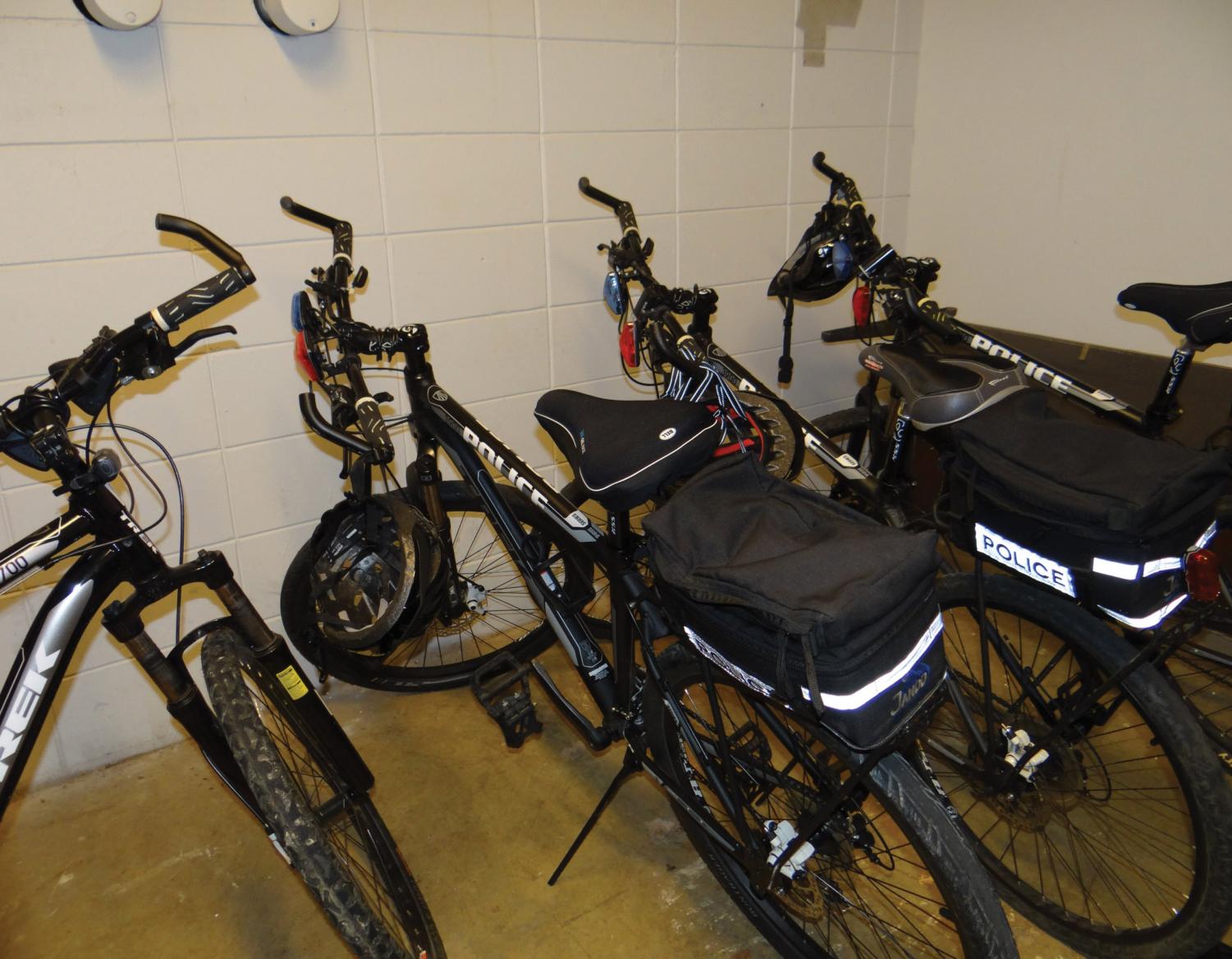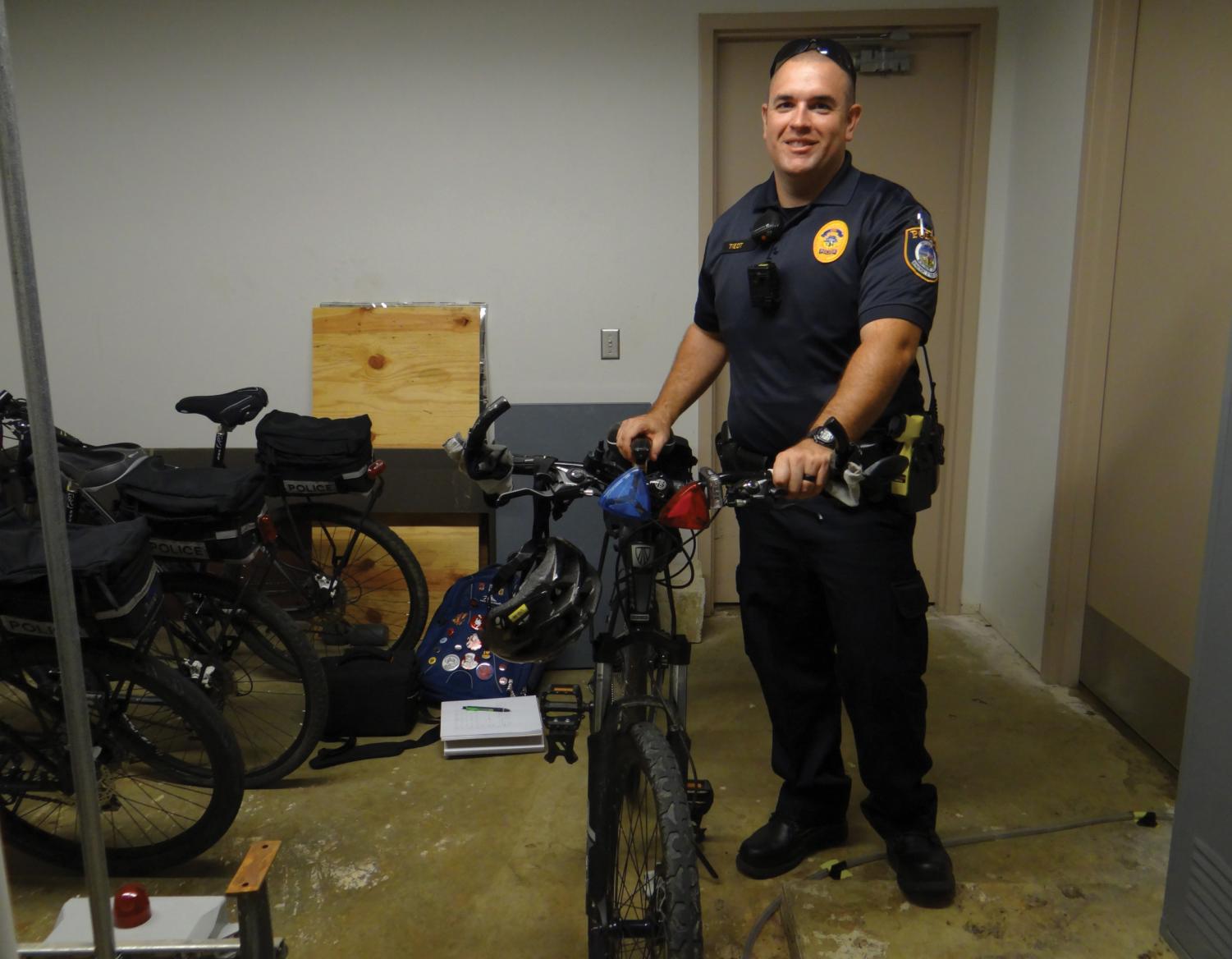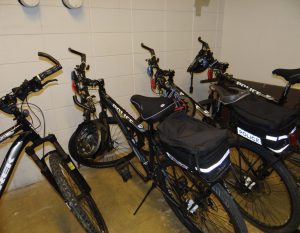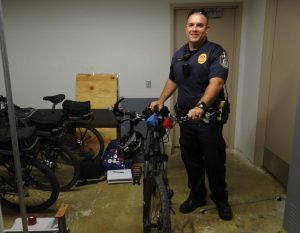Shifting gears: UNI bike patrol officer changes routine
Oct 21, 2019
Jeff Tiedt works as a UNI police officer, but his job doesn’t always involve a squad car.
Three years ago, Tiedt was asked to fill an opening in a division of UNI’s police department that has been using bicycles to patrol since 1994. So far, the 31-year-old has found it to be a unique experience.
“It’s just something different to get out of a squad car and still be able to do my job as an officer,” Tiedt said. “It’s a different experience. Instead of being in a squad car and driving around all day, I can do something else.”
Before he joined the bike patrol unit on campus, Tiedt got into law enforcement in 2010 by working at a county jail. In 2012, he left the jail and decided to work as a police officer. He attended the Iowa Law Enforcement Academy in 2013 and was hired by the Department of Public Safety at UNI the next year. After leaving for a brief period in 2017, he returned in 2018. Although he grew up in Readlyn, Iowa, he now lives with his wife and children in Waverly.
Tiedt’s siblings inspired him to become a police officer.
“I have two older brothers that are in law enforcement, and learning of their excitement in law enforcement got me excited to be a police officer after initially going to school to be a social studies teacher,” Tiedt said. “It’s hard to explain why someone gets into law enforcement, but there is a driving force that cannot be explained.”
The UNI bike patrol consists of UNI police officers who patrol for 40 hours a month on their bicycles. There are two officers on each shift to allow for coverage throughout the day. Counting the police chief, seven officers out of 18 are currently members of the bike patrol. As long as the weather permits, this division operates from April through September. On special occasions, bike patrol officers will also work during homecoming activities.
Many of the duties that officers perform in squad cars can also be done while on a bicycle. However, there are a few challenges that occur when officers are pedaling. For example, Tiedt finds it difficult to enforce vehicle and traffic laws. He has found that working on a bike does not provide the security and protection of a police vehicle. When officers are called into violent situations while on a bike patrol, they don’t have a rifle or extra ammunition. While they still have their handguns, officers will often have to wait until a second cop arrives on the scene.
Even with these challenges, Tiedt still finds several benefits to using the bikes. Because UNI Police operates in a small area, he finds that the bikes let them reach places faster than if they were trying to get somewhere using a squad car. This results in quicker response times and maneuverability through campus.
Tiedt has discovered that the UNI bike patrol has allowed their department to get more in touch with the local community.
“It gives you a chance to be more personal with students, staff and faculty,” he said. “Being in a squad car is a comfort zone. Being on a bicycle takes you out of that comfort zone a little bit. You’re more exposed and out in the public eye when you’re on a bicycle. You can converse more and you’re more approachable.”
In addition to promoting positive community relations, the UNI bike patrol has also been an advocate for “Sole Power,” an initiative by Wellness and Recreation Services to get students and faculty to use healthier, non-motorized means of transportation.
Despite the positives of having a bike patrol on-campus, Tiedt acknowledged that it isn’t for every police department. He said that while bike patrols work well in a small campus for routine patrols, a place such as Waterloo might use them differently. With the increased frequency of violent situations in that area, bike patrol usage could be reserved for special events.
Although bike patrols exist in multiple police departments throughout Iowa, the state does not require any certification. Instead, optional training is provided to officers that request it. Topics for the training include pursuits, going up and down stairs and navigating different terrain types. This training lasts for approximately one week and typically ends with a 40 to 60 mile bike ride. While Tiedt has not personally attended one of these training sessions, he recognized their potential for self-improvement.
UNI Police provides other types of specialized training that can enhance a bike patrol officer’s abilities, including riot training, drug-related training and hand-to-hand combat instruction — which Tiedt is in charge of.
In addition to their training and expertise, bike patrol officers bring a variety of tools and gadgets to help them do their jobs. Each bike is created with lightweight materials and off-road style tires. Both the front and rear of the bikes are equipped with red and blue police lights. According to Tiedt, these are good for conditions with low-light vision. Underneath the seat of the bike, there is a pair of zip cuffs, PBT tubes, a bike repair kit, a respirator mask for CPR and a citation book/ticket-writer.
While each bike has standard-issue equipment, some officers bring specialized tools to suit their needs.
“There’s an officer that has a speedometer,” Tiedt said. “The fastest I’ve gone is 40 miles per hour downhill. You can cruise pretty good on these.”
Although there are special occasions and circumstances during each day, Tiedt described his methods of approaching the job as routine. As he’s continued his duties as a bike patrol officer, he’s learned how to make it a part of his schedule.
“All police officers are creatures of habit,” Tiedt said. “There’s a certain routine for everything. Even on bike patrol, there’s a certain routine you just do, a certain path you follow when you’re riding a bike. There are certain areas with high traffic. It’s simple, police officers don’t like change. There’s so much in your day that’s out of your control; you get a suicidal subject, you need an ambulance here or we have a fight here. There’s so much that’s unknown throughout the day that what you can control, you do control.”











